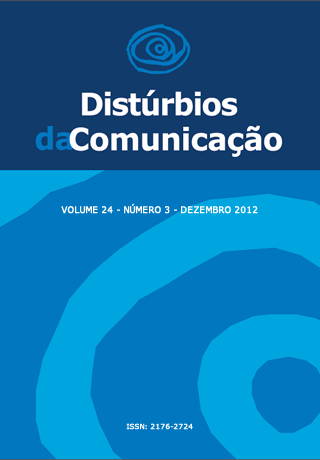Quando a posição fluente se perde: desarmonia entre fala e língua
Palavras-chave:
gagueira, linguagem, linguística.Resumo
Objetivo: Desenvolver compreensão sobre a desarmonia entre fala e língua a partir do discurso de pessoas adultas com gagueira. Métodos: Foram realizadas entrevistas semi-estruturadas com 6 adultos que gaguejam, a partir de perguntas-chave. Após a transcrição dos discursos, a noção de práticas discursivas e produção de sentidos permitiu que se definissem três categorias analíticas. Resultados: As categorias foram: Sentido da Fala (Positivo e Negativo); Contexto de Fala (Efeito Outro e Efeito Sozinho) e Antecipação da Gagueira. Em Sentido da Fala – Positivo os entrevistados relataram os modos de se sentir relacionados a fluir melhor na fala e a permitir-se gaguejar. Em Sentido da Fala – Negativo os entrevistados relataram sentir-se dessemelhantes e marginalizados por seu modo de falar. Em Contexto de Fala – Efeito Outro, os entrevistados mostraram que ao ocuparem a posição de falantes gagos imaginam o outro como aquele que fiscalizará seu dizer. Em Contexto de Fala – Efeito Sozinho, os entrevistados reiteram a gagueira como uma manifestação fortemente atrelada à presença do outro. Em Antecipação da Gagueira os entrevistados revelam os modos como a gagueira é prevista subjetivamente antes de materializar-se na fala. Conclusão: a desarmonia entre fala e língua, no discurso gaguejante, relaciona-se a um falante que se sente estigmatizado em certas condições de produção discursiva; a desarmonia entre fala e língua se materializa com a finalidade de evitar a gagueira prevista. Tais características assinalam alguns elementos que parecem importantes ao direcionamento de uma abordagem terapêutica fonoaudiológica da gagueira que pretenda superar o modo de funcionamento subjetivo/discursivo que a sustenta.
Downloads
Métricas
Downloads
Publicado
Edição
Seção
Licença
Copyright (c) 2012 Wladimir A.P. de L. Damasceno, Silvia Friedman

Este trabalho está licenciado sob uma licença Creative Commons Attribution 4.0 International License.









